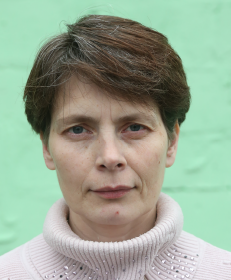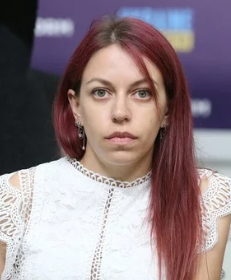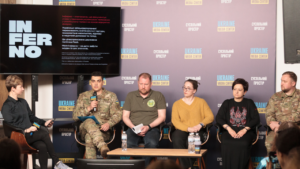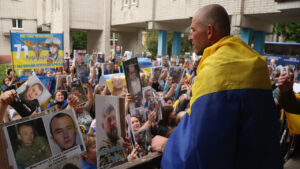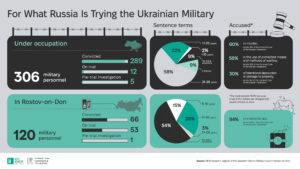Marines of the 36th Brigade: Two Years of Cruel Treatment in Captivity
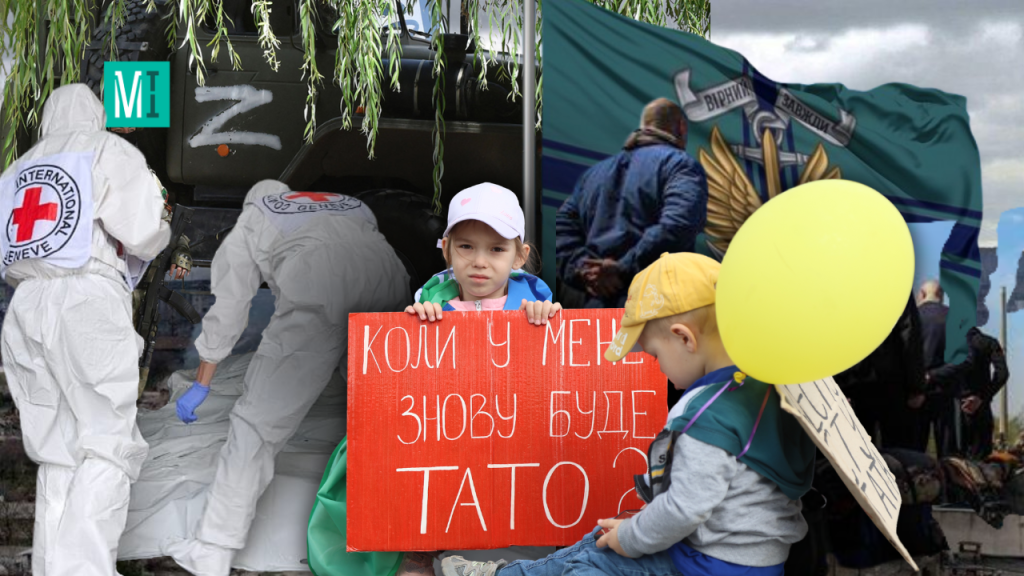
Several thousand Ukrainian marines are in captivity. Most of them have been kept since the first months of the war. They are rarely exchanged, and have almost never been released lately. The marines are held compactly in several colonies. They are subjected to cruel treatment and illegal prosecution. Many marines are in critical condition, and some of them die in captivity.
Captivity and cruel treatment
The 36th Separate Marine Brigade Named after Rear Admiral Mykhailo Bilynskyi defended Mariupol at the very beginning of the full-scale invasion. In March-May 2022, almost two thousand of its fighters were captured by Russians. According to the Coordination Headquarters for the Treatment of Prisoners of War, only 287 members of this brigade have since been released from captivity. The rest are held in detention facilities in Taganrog, Valuyki, Kursk, Pakino, Mordovia, and within the occupied territories of Luhansk and Donetsk Oblasts.

Places where the prisoners of war, who are members of the 36th Separate Marine Brigade, are kept in the Russian Federation and within the occupied territories of Ukraine
Witnesses interviewed by the MIHR say that marines are treated particularly brutally in Russian penal colonies and pre-trial detention centers. Former prisoner of war Maksym Kolesnikov witnessed the transfer of 176 marines to the Novozybkov Pre-Trial Detention Center in May, 2022. According to him, Ukrainian soldiers were beaten there all the time, and they were not allowed to sit during the day. “We had to stand in a line. That was the worst option – to stand all day long. Sometimes they allowed us to walk or stand by the wall, but not to sit. We tried to find a place that could not be seen through the peephole, and that’s how we would have a rest,” Kolesnikov says. He recalls that prisoners had swollen legs and festering wounds due to constant standing.

Maksym Kolesnikov, the former prisoner of war, before captivity (right) and immediately after the exchange on February 4, 2023
As a punishment, prisoners of war were forced to squat. Yevhen, who was also kept in the Novozybkov Pre-Trial Detention Center, says, “We set a record – we squatted 3,600 times in one day.”
Marines are also held in Tula Oblast, including fighters from the 501st battalion. Some of them spent a long time in solitary confinement cells, where they were beaten, not allowed to sleep, and were forced to confess to crimes they had not committed. “If you fall asleep in a solitary confinement cell, they wake you up and beat you. I remember that one prisoner stood like that for 13 days in a row. He started hallucinating. I heard him screaming, and then he said, “I will sign,” says former prisoner of war Bohdan Slobodian.

Bohdan Slobodian, the former prisoner of war, at the press-conference, organized by the MIHR Photo by Viktor Kovalchuk
Ukrainian soldiers are poorly fed in captivity. They lose weight to extremely dangerous extent. Maksym Kolesnikov, who lost 32 kg in 10 months of captivity, says, “They cut bread into 8-10 pieces instead of six chunks as per instructions. For lunch, we had soup – sliced potatoes in a liquid, sometimes it was more or less thick. When they thought that there might be an inspection, they gave sliced beef: frozen meat with all the fibers cracked that was chopped into pieces. We joked that this meat must date back to the time of Comrade Stalin.”
Prisoners of war get sick due to continuous abuse and inadequate nutrition, but they have almost no access to medical care. Yevhen Didkivskyi from the 95th brigade was held in penal colony No. 9 in the city of Borisoglebsk. He recalls a guy from the 36th Separate Marine Brigade, “They brought a marine with an injured leg. His right leg was swollen all the time, and there was a hole in his leg from which some kind of liquid was constantly oozing.” According to Didkivskyi, many prisoners suffered from erysipelas (an inflammatory skin disease). “Inflammation begins on the legs, and the skin color changes from red to dark brown. The legs swell, a fever begins, and it is impossible to stand, sit or lie”. Some prisoners also have tuberculosis.

Yevhen Didkivskyi, the former prisoner of war, during a one-man campaign conducted in Kyiv to support prisoners of war
Hanna Bei, the wife of prisoner of war Pavlo Bei, the senior sailor of the 501st Separate Marine Battalion, says the following about her husband’s health: “His legs are very swollen. The skin changed color, it became carrot-red, the capillaries burst, and if his legs are cold, they turn blue. This is a sign of varicose veins. He also has memory problems. Two fingers on his right hand don’t work. In addition, all guys have problems with their teeth – they fall out.” According to Hanna Bei, her husband, who is 188 cm tall, weighed about 95 kg before captivity. Now he weighs 60 kg. Unsanitary conditions, parasites and rodents add to the problems.
“I found out the things that I, as a mother, probably shouldn’t have known about”
Relatives of prisoners of war from the 36th brigade believe that the prisoners, who have been in captivity for more than two years, no longer have strength to hold on. Milana Kompaniiets, the mother of sailor Yurii Hulchuk, recalls that her son dreamed of becoming a translator. He studied at the Faculty of Chinese Philology and knew English well. However, the guy joined the army after his second year. When Russia’s full-scale invasion began, he defended Mariupol as a member of the 36th brigade. The family lost contact with Yurii Hulchuk on April 4, 2022. It turned out that he was in captivity. Some time later, Russians posted a photo of the guy on social networking websites. “No one could recognize him except me. It was a completely different person,” says Milana Kompaniiets. “And in January 2024, I found out the things from those released from captivity that I, as a mother, probably shouldn’t have known about. My son was given electric shocks in the groin until he lost consciousness and his legs became paralyzed. Has he recovered? I hope so. I’m a doctor and I know that it’s possible. Theoretically.”

Milana Kompaniiets, the mother of captured sailor Yurii Hulchuk. Photo by Viktor Kovalchuk
According to Milana Kompaniiets, her son is unable to speak because of beatings in captivity. “He is a very talkative person, and speaking means the world to him. After being beaten once again, he lay unconscious for four hours. When he regained consciousness, he showed guys the OK sign with his fingers – meaning that he was alive. But he lost the ability to speak. I think it was either a microstroke or some other injury to the nervous system.”
Ukrainian soldiers released from captivity say that they were forbidden to complain about their health in pretrial detention centers and colonies. Those who dared to complain were tortured with electric shock. If teeth hurt, they are pulled out or knocked out. According to Milana Kompaniiets, 14 of the 16 types of tortures listed in the Istanbul Protocol were inflicted on the marines. There are also cases of death of former captives after their release from captivity. The cause is chronic malnutrition that leads to heart failure. “The heart muscle becomes thinner, its volume decreases, and dysfunction develops. And when a person begins to move actively after this, the heart fails,” Milana says. That is why, according to her, those who were kept in captivity for a long time should be categorized as “captives of long-term imprisonment” and subjected to a special treatment and rehabilitation procedure.

This is how Ukrainian soldiers look after Russian captivity. Photo by Kostiantyn Liberov and Vlada Liberova
Together with other families of captured marines, Milana Kompaniets actively complains about the conditions in which Ukrainian soldiers are held. Complaints are sent to all relevant Russian institutions. We have achieved certain results. The guys said that there was a very important commission late in the autumn last year. They did not do anything to the guys, but they started giving them chicken and a little fish. We know that our letters to the Federal Penitentiary Service and the relevant Russian presidential committee worked. Yes, our letters worked, but surprisingly nothing has ever worked with the International Committee of the Red Cross.”
It is significant that the ICRC should monitor the conditions in which prisoners of war are held in Russia. These authorities are specified in the Geneva
Convention of 1929. According to the Convention, Red Cross employees are allowed to visit all places where prisoners of war may be held, and they can talk to prisoners in person or through an interpreter. However, in case of the fighters from the 36th brigade, there is no information about ICRC representatives visiting them. “I was not so lucky to meet representatives of the Red Cross either in Olenivka, or in Ryazhsk, or in Mordovia, where I was held,” says former prisoner Oleksandr.
Ukrainian soldiers had an opportunity to see persons dressed in ICRC uniform only once when they were captured while leaving the Azovstal plant in May 2022.
“There is a right to send and receive letters, but we do not have this right”
Yuliia Petryk is the head of the non-governmental organization “Families of Officers and Artillerymen of the 36th Marine Brigade”. She is the wife of Mykyta Petryk, the captive officer of the 36th brigade. She says, “Our marines have been held captive in terrible conditions for over two years. They are starved to death, tortured and subjected to psychological abuse and sexual violence. At the same time, Russian prisoners of war have the right to make phone and video calls. They are provided with sweets and even cigarettes!”

Yuliia Petryk, the head of the non-governmental organization “Families of Officers and Artillerymen of the 36th Marine Brigade” and the wife of Mykyta. Photo by Viktor Kovalchuk
Petrik emphasizes that although the status of captives has been confirmed by the ICRC, their relatives have no official information about where exactly the soldiers are held or what their health issues are. “According to the Geneva Conventions, there is a right to send and receive letters, but we actually do not have this right. All the information we have about captives is received from their fellow soldiers who have already returned to their native land,” says the woman. “But we are not even sure whether our relatives are alive, because there are cases when bodies of prisoners of war are returned though their status was confirmed by the ICRC.”
176 bodies of those held in captivity have been returned since the beginning of the full-scale invasion of Ukraine. About 80 of them have the status confirmed by the ICRC.
“Marines account for about half of the tortured bodies that the Russian Federation transfers to the Ukrainian side,” says Olena Bieliachkova, the coordinator of the Media Initiative for Human Rights responsible for communication with families of prisoners of war. According to Olena, the bodies come mostly from the same places with the harshest conditions of detention.

Return of dead Ukrainian soldiers to Ukraine. Photo by Coordination Headquarters for the Treatment of Prisoners of War
After the return of bodies of Ukrainian captives, experts often establish that these people died in a penal colony six months or even a year ago. And there is an explanation for this. The fact is that the longer a body is stored, the less chance there is to identify causal factors associated with the death.
“We understand that time works against our prisoners of war. And the conditions in which they are kept, as well as the tortures they endure may result in an increased number of bodies returned from captivity,” says Olena Bieliachkova. She notes that, according to international standards, seriously wounded and gravely ill soldiers should be released from captivity unconditionally. And the International Committee of the Red Cross, as the organization in charge of monitoring compliance with international humanitarian law, should ensure this.
Lawyer and expert of the MIHR Andrii Yakovliev says that complaints against the ICRC are not that it fails to fulfill its obligations, but that it passively responds to how Russia prevents the Red Cross from using its mandate to visit prisoners and maintain communication with them.
Andrii Yakovliev also stresses the fact that, in violation of the Geneva Conventions, Ukrainian captives have no contact with the outside world, and their relatives know nothing about them. As a result, Russia manages to conceal the cases of torturing prisoners, which is a war crime. Moreover, this crime is committed not only by those who torture, but also by those who give orders to torture or fail to ensure compliance with the laws which makes it possible to torture a person. Analyzing the testimonies given by former prisoners of war allowed the MIHR to identify the same types of tortures inflicted using the same means in different regions of Russia. Therefore, we can state that this crime is facilitated or encouraged at the federal level, that is, the blame lies with the federal level leadership.

Rally organized to support captive members of the 36th Separate Marine Brigade. Photo by Viktor Kovalchuk
“The UN Monitoring Mission has published several reports confirming systematic tortures inflicted on Ukrainian prisoners of war,” says Andrii Yakovliev.
“But the fact that responsible Russian officials, including federal ones, fail to take measures to prevent these violations of the international humanitarian law, means that they assume the responsibility and thus de jure admit their guilt.”
An effective tool for influencing such violators would be arrest warrants for specific guards, directors of pre-trial detention centers or penal colonies where Ukrainian captives are held, or high-level leaders. These warrants should be issued either by the International Criminal Court, or courts that have international jurisdiction, or our courts. The key condition is to put suspects on the international wanted list so that they are arrested wherever they go. This should restrain cruelty towards Ukrainian prisoners of war so that they survive captivity and eventually return to Ukraine.


